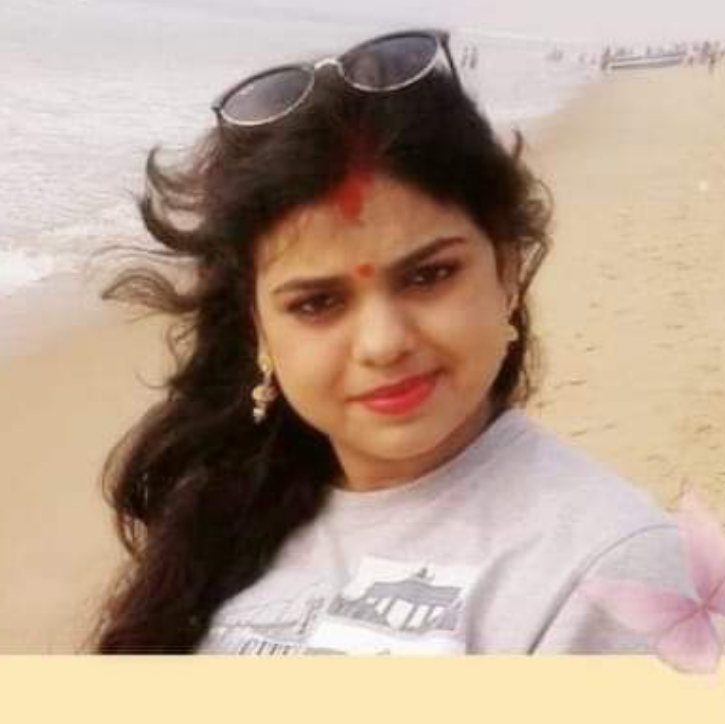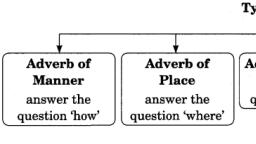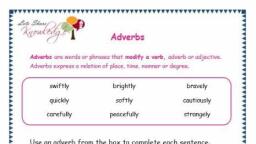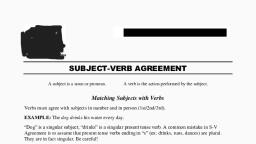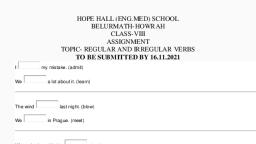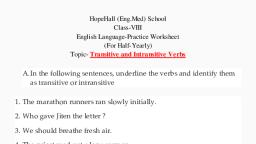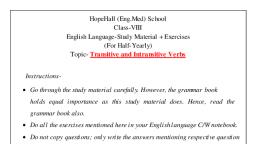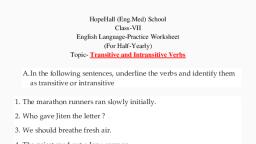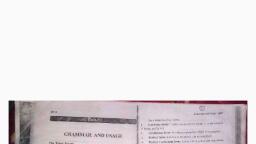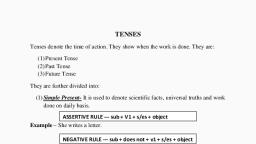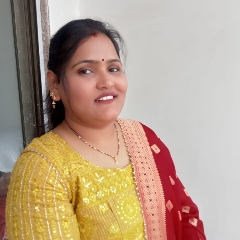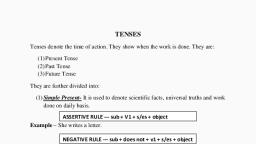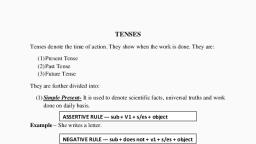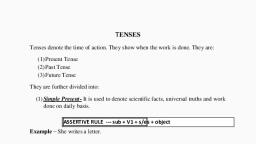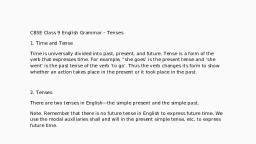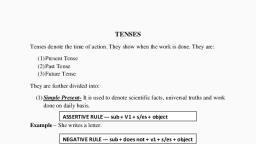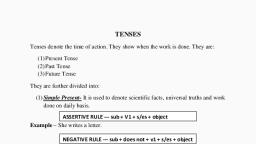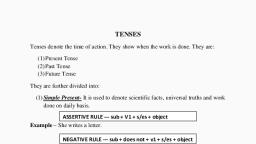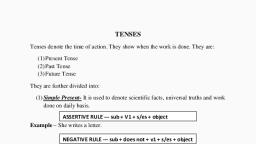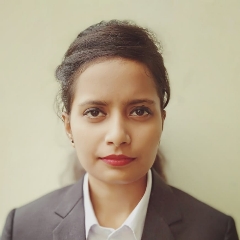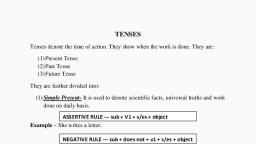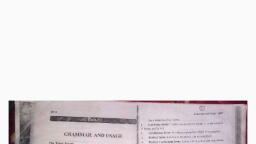Page 1 :
HOPE HALL(ENG.MED) SCHOOL, BELURMATH-HOWRAH, CLASS-VIII, ENGLISH LANGUAGE- STUDY MATERIAL, TOPIC-TENSES
Page 2 :
Read the following sentences carefully :, 1. Birds fly in the air., 2. My brother flew to England last week., 3. I shall fly a kite on Sunday. –, In the first sentence the Verb ‗fly‘ refers to the Present time, in the second sentence the, Verb ‗flew‘ refers to the action in the Past, while the Verb in the third sentence ‗shall fly‘, refers to the Future.
Page 3 :
The Tense of a Verb shows the time when an action takes place., There are three Tenses :, I. Present Tense, II. Past Tense, III. Future Tense, 3. In order to show at what stage an action is, each of the three tenses has been subdivided into four heads. These sub-divisions are—, , Continuous, Tense, , Indefinite, , or, , Perfect, , Continuous, , Progressive, , Present I play, Past, , I played, , Perfect, , I am playing, , I have played, , I have been playing, , I was playing, , I had played, , I had been playing, I shall have been, , Future I shall play, , I shall be playing, , I shall have played, playing, , Thus, the tense of a verb does not show the time of an action or event alone. It shows the, state of that action also.
Page 4 :
The Present Tense, A. Simple Present Tense, The Simple Present is used to express :, (i) A habitual action, (ii) A general truth, (iii) What is happening (in exclamatory sentences only), (iv) An order or request., (i) A habitual action :, I go for a walk daily., He comes to school at 8 O‘clock., (ii) General truth :, The sun rises in the east., Two and two make four., (iii) What is happening :, Here comes the chief guest !, (iv) An order or request :, Obey your teachers., B. Present Continuous Tense, (Is/am/are + Verb + ing), (i) In order to form the Present Continuous Tense, we add Present Participle to is, am or, are. The Present Participle is formed by adding ‗ing‘ to the first form of the verb., ‗Is‘ is used with he, she, it or Third Person Singular Noun, ‗am is used with T and ‗are‘ is, used with we, you, they and plural Nouns., Examples: She is singing a song., (ii) In Interrogative form, the helping verb is used before the subject., [Is/am/are + Subject + (Verb + ing)……….. ?], Examples : Are you going home ?, (iii) In Negative form, we add ‗not between the Principal Verb and the operative helping, verb., [Subject + is/am/are + not + (Verb + ing) …], Examples: She is not weeping.
Page 5 :
C. Present Perfect Tense, (Subject + Has /have + III form of the verb), (i) In the Present Perfect Tense the past participle (III) form of the verb is used with has or, have. ‗Has‘ is added with third person singular subjects, as—‗he‘, ‗she‘, ‗it‘ and ‗Have‘ is, added with T, ‗we‘, ‗you, ‗they‘ and plural nouns., He has won a prize., You have insulted me., I have taken the dose of medicine., (ii) In Interrogative form [Has, have are placed before the subject.], (Has/have + Subject + III form of the Verb…?), Have they crossed the river ?, Where have you seen my brother ?, (iii) In Negative form [‗not‘ is used between the main verb and the helping verb. ], (Subject + has/have + not + III form of the Verb…), She has not come yet., I have not received any information., (a) To express an action that has been recently completed., I have just received the letter., (b) To describe an action the time of which is not given., The train has steamed in., (c) To describe a past experience., I have seen this picture several times., (d) To express an action that began in the Past and still continues., He has worked in this school for five years, (is still working), D. Present Perfect Continuous Tense, [Subject + has/have + been + I form of the Verb + ing…), In order to form the Present Perfect Continuous Tense, we put has been or have been, before the Present Participle Form of the Verb ; as—, It has been raining for two hours., I have been flying a kite since 2 O‘clock., (a) The Present Perfect Continuous Tense is used to describe an action that began in the, Past, is still continuing and may extend into the Future ; as—
Page 6 :
She has been waiting for you for three hours., They have been playing cards since 10 A.M., (b) This tense is also used to express an action in a sentence which begins with ‗For how, long or ‗Since when‘, as in—, For how long have you been sitting here ?, Since when has he been living in this house ?, (c) This tense is also used to express an action which began in the past and has been just, completed. However, its result is visible in the present, as in—, I have been studying since morning and I am much tired now., She has been washing the dishes for an hour and her clothes are dirty now., Note : Since is used fora point of time., For is used for a period of time., II. The Past Tense, A. The Past Indefinite Tense, Or, The Simple Past Tense, (Subject + II form of the Verb…), In the Simple Past (Past Indefinite) Tense the second form of the Verb is used :, as—, He came here yesterday., ‗Did‘ is used in the Interrogative and Negative sentences. ‗Did‘ is also used to lay, emphasis. Only the first form of the Verb is used with ‗did‘., (i) In Interrogative Sentences [‗did is placed before the subject and verb in first form after it, ; as—], (Did + Subject + I form of the Verb…?), Did you show me your homework ?, (ii) In Negative Sentences [‗did not‘ is put after the subject and first form of the verb is, used thereafter : as—], (Subject + did + not + I form of the Verb…), I did not apply for leave., Exception—I never told a lie., (This sentence means—I did not ever tell a lie), (iii) To lay emphasis, I did try to solve the question but was not able to solve it.
Page 7 :
Uses of the Past Indefinite Tense, The Past Indefinite (Simple Past) Tense is used :, (a) To express an action completed in the past with reference to the time of speaking., I saw many birds in the zoo., (b) To express habitual or regular action in the Past., Gandhiji always spoke the truth., (c) To express an event which occurred at a particular point in the Past., My father came back home yesterday., (d) To express an action which occupied a period of time in the Past, but is now ended., We lived in this house for ten years. (do not live now), I stayed at the Green Hotel for two months. (not staying now), (e) To express an action where some word, showing past action (yesterday, ago. last,, etc.) is given in the sentence, as,, He received your message yesterday., I passed the S.S.C. Examination last year., B. The Past Continuous Tense, (Subject + was /were + I form of the Verb + ing…), (i) The Past Continuous Tense denotes an action going on in the past. In order to form, Past Continuous Tense we add Present Participle to was or were ; as—, The train was running at full speed., (ii) In Negative form [‗not‘ is placed between the helping verb and the principal verb ; as—], (Subject + was/were + not + Verb + ing…), She was not weeping., (iii) In Interrogative form [the helping verb is placed before the subject ; as—] (Was/were +, Subject + Verb + ing + … ?), Were the sheep grazing in the field?
Page 8 :
C. THE PAST PERFECT TENSE, (Subject + had + III form of the Verb ), We often make mistakes while using the Past Perfect Tense. We use ‗had‘ at random, wherever we view ‗past action‘ in a sentence in our mother-tongue., I had gone to Delhi yesterday., This sentence should be formed in Simple past., I went to Delhi yesterday., The structure of Past Perfect is—, In order to form the Past Perfect Tense we use ‗had‘ before the Past Participle (III) form of, the Verb., (i) In Interrogative form [‗Had is used before the subject], (Had + Subject + not + in form of the Verb + ……… ?), Had he left when you came ?, (ii) In Negative form [‗not is used after ‗had‘], (Subject + had + not + III form of the Verb + ………… ), I had not seen you before., Uses of the Past Perfect Tense, (a) The Past Perfect Tense is used to express an action completed before another action, took place ; as—, When he came to me, I had posted the letter., (b) (i) It is also used to express an unfulfilled action in the past ; as—, If she had worked hard she would have passed., (ii) It is also used to express an unfulfilled wish in the past ; as—, I wish I had won the election., (c) To denote the action or event which has been completed before some point of, time., By afternoon he had completed much work.
Page 9 :
D. The Past Perfect Continuous Tense, (Subject + had + been + Present Participle…), (a) The Past Perfect Continuous Tense expresses an action that had been going on for, some time in the past. In order to use this tense we use had been with Present Participle, (ing) form of the verb., Examples: Children had been playing since morning., (b) The Past Perfect Continuous Tense is also used to express an action that had been, going on for some time before another action took place in the past ; as—, Examples: They had been playing chess for two hours when I joined them., (i) In Interrogative form, ‗had precedes the subject and ‗been‘ comes after the subject;, as—, Had he been quarrelling with you for some time ?, (ii) In negative form, ‗not‘ is placed after ‗had‘ and before ‗been‘ ; as—, They had not been working on this project for many years., , III. THE FUTURE TENSE, A. The Simple Future/Future Indefinite Tense, (Shall/ will + Verb), The Future Indefinite Tense is used to express the action or event which is likely to, happen in Future. In this tense we use shall/will between the subject and the first form of, the verb. Normally we use ‗shall with pronouns of first person (I, We). In the same way. we, use ‗will with the pronouns of second person (you) and third person (he, she, it, they)., (i) In Negative sentences ‗not‘ is added after ‗shall/‗will as the case may be ; as— We shall, not see the picture today., (ii) In Interrogative sentences ‗will‘/‗shall‘ is placed before the subject and first form of the, verb after it ; as—, Will you go to college today ?, B. THe Future Continuous Tense, (Will/shall + be + Verb + ing), The Future Continuous Tense is used to express an event that is expected to take place, in the normal course or at some time in the future ; as—, We shall be playing a football match on Sunday., The new edition of this book will be coming out shortly., When I reach Calcutta, it will be raining heavily there., Will you be taking part in the debate ? (Interrogative), The farmers will not be watering the plants at this time. (Negative)
Page 10 :
C. The Future Perfect Tense, (Shall/will + have + III form of the Verb), (i) The Future Perfect Tense expresses an action which is expected to be completed by a, certain time in the Future ; as—, She will have covered half of her journey by Monday next., (ii) The Future Perfect Tense sometimes expresses the speaker‘s belief that something, has taken place. In such sentences it does not express the Future ; as—, ―You will have discussed the plans how to celebrate the function‖, said my mother., (iii) It is also used for an action which at a given future time will be in the past; as—, In two years‘ time (i.e., two years from now) I shall have taken my degree., , D. The Future Perfect Continuous Tense, (Shall/will + have been + Verb + ing), The Future Perfect Continuous Tense is used to express an action that will have been, going on at or before some point of time in the Future ; as—, We shall have been waiting for you for a long time.
Page 11 :
I. Rewrite the following sentences changing the Verb into the Future Tense :, 1. I reached the station after the train had left., 2. The log of wood broke and they fell into the ditch., 3. They bound his hand and foot and held him fast., 4. I broke the lock open and got into the room., 5. The gardener was watering the plants., 6. You have really committed a blunder., 7. He found her weeping bitterly., , Answers:, I. 1. I shall reach the station before the train leaves., 2. The log of wood will break and they will fall into the ditch., 3. They will bind his hand and foot and hold him fast., 4. I shall break the lock open and get into the room., 5. The gardener will be watering the plants., 6. You will have really committed a blunder., 7. He will find her weeping bitterly., 2. Fill in the following blanks with correct tense of the verbs given in brackets (Past, Tense)., 1. She ………….. hard since December. (study), 2. Sarla ………….. her lover for many years. (befool), 3. How long ………….. the two neighbours ………….. when a third one joined them ?, (quarrel), 4. I ………….. for four hours when you knocked at my door. (sleep), 5. Tenzing ………….. to climb Everest for many years before he succeeded in his mission., (try), Answers:, 1. had been studying, 2. had been befooling, 3. had, been quarrelling, 4. had slept, 5. had been trying.
Page 12 :
3.Fill in the following blanks with correct tense of the verbs given in brackets. (Past, Tense), 1. Mohan ………….. already ………….. his breakfast. (take), 2. If she ………….. for the examination she would not have failed. (prepare), 3. The bell ………….. before I reached the school. (go), 4. The patient ………….. before the doctor arrived. (die), 5. She ………….. not ………….. the place before her husband permitted her. (leave), 6. ………….. the child ………….. before his mother returned from office ? (sleep), 7. The rain ………….. when we stepped out of our house. (stop), 8. If you ………….. her, she would have got first division. (help), 9. The cinema show ………….. when I reached the hall. (start‘, 10. If she ………….. a bus, she would have caught the train. (board), Answers:, 1. has, taken, 2. had prepared, 3. had gone, 4. had died, 5. had, left, 6. Had, slept, 7. had stopped, 8. had helped, 9. had started, 10. had boarded., 4. Fill in the following blanks with correct tense (present) of the verbs given in, brackets :, 1. Where ………… you ………… your purse ? (lose), 2. ………… she not yet her work ? (finish), 3. How many sums ………… she ………… ? (solve), 4. My sister ………… from Meerut presently. (return), 5. Raju ………… Saroj since 1980. (know), 6. Asha ………… never ………… the Red Fort. (see), 7. ………… you not ………… your bath as yet ? (take), 8. I ………… not ………… my lesson. (revise), 9. We ………… not ………… from Rajni for the last four months. (hear), 10. She ………… in Delhi for eight years. (live), Answers:, 1. have, lost, 2. Has, finished, 3. has. solved
Page 13 :
4. has returned, 5. has known, 6. has, seen, 7. Have, taken, 8. have, revised, 9. have, heard, 10. has lived, , Fill in the following blanks with correct tense of the verbs given in brackets :, 1. Look ! the sun ………… (rise), 2. Why ……….. you ………….. so fast ? (run), 3. The children ………. .in the park. (play), 4. Mohini ……….. a novel now. (read), 5. Water …………. from the running tap. (flow), 6. …………… it ………… outside now ? (rain), 7. What …………. your sister these days ? (do), 8. I ………… tonight. (return), 9. They …………… for Kanpur tomorrow. (leave), 10. Why ………… you ……….. a noise ? (make), Answers, 1. is rising, 2. are, running, 3. are playing, 4. is reading, 5. is flowing, 6. Is, raining, 7. is, doing, 8. am returning, 9. are leaving, 10. are, making
